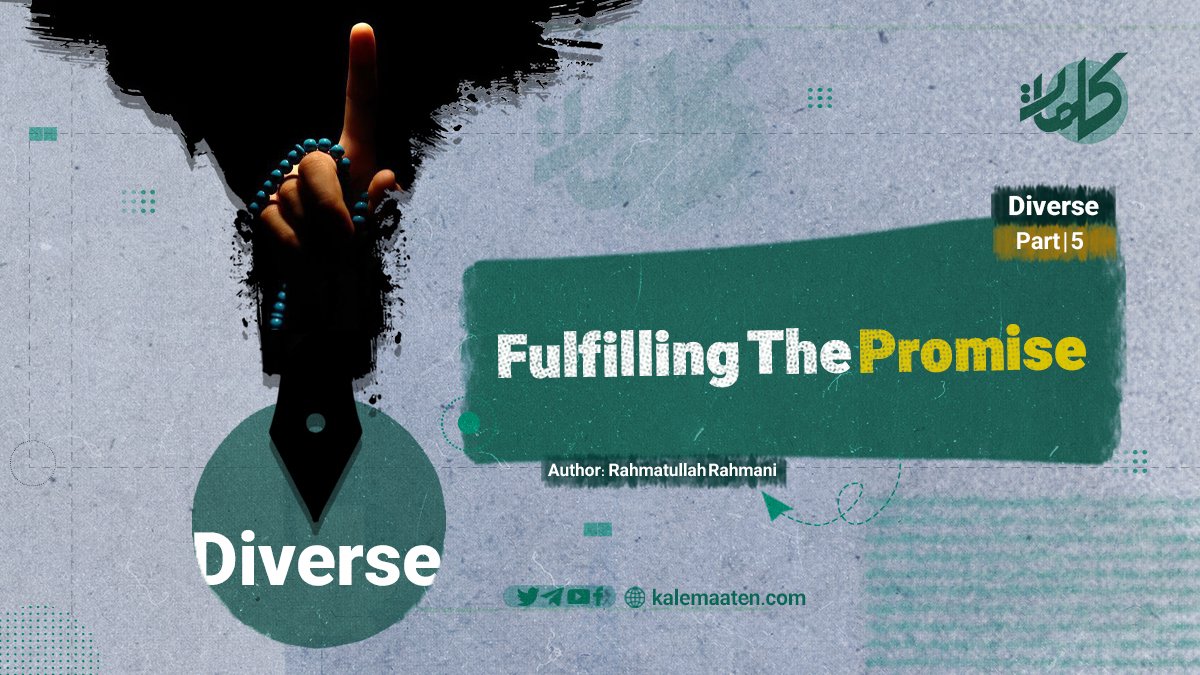Author: Rahmatullah Rahmani
Fulfilling the Promise (Part Five)
Indeed, great prophets need men like the Ansar more than anything else; men who sacrifice their lives, spirits, and wealth to fulfill their covenant and their words, who are not preoccupied with the trivial desires of this world, and who do not seek the lowly gains of this life. The Prophet’s (peace be upon him) way of distributing the spoils was based on their faith and sincerity. He won the hearts of the Arabs with the wealth they desired so that they would not be disturbed by the religious duties they had accepted, and he entrusted the Ansar with a true and firm belief that he saw in them. In such matters, the Prophet (peace be upon him) said: “أنّى لأعْطِيَ الرَّجُلَ و غَيْرُه اَحَبُّ إِلى مخافة أَنْ يَكُبَّهُ اللهُ فِي النَّارِ”Translation: “I give to a man while I love another more than him, and I give him this wealth to prevent him from straying and so that Allah does not throw him into the Hellfire.” (Meaning, giving wealth to someone does not necessarily mean that they are loved more than others.)
One of the aspects of true loyalty to the covenant is to remember one’s past good deeds so that one can benefit from them in the present and future. Thus, if one was poor and Allah made him wealthy, or if one was ill and Allah healed him, he should not create a thick wall between his past and present, thinking that he was never poor or ill. As a result, one should not adopt an arrogant, harsh, rude, or ungrateful attitude. Such behavior is a form of betrayal that leads to hypocrisy, and it may deprive one of Allah’s mercies, with the possibility of never being able to return to it.
It is narrated that one of the people of Medina, named Tha’labah, came to one of the Ansar’s gatherings and took them as witnesses, saying: “If Allah blesses me with wealth, I will give the due rights to their owners, pay the Zakat, and maintain ties of kinship.” Then, a cousin of his died, and he inherited wealth. However, he did not fulfill any of the promises he had made and did not give anything to anyone. Concerning this, the following verse was revealed: “وَمِنْهُم مَّنْ عَاهَدَ اللَّهَ لَبِنْ آتَانَا مِن فَضْلِهِ لَنَصَّدَّقَنَّ وَلَتَكُونَنَّ مِنَ الصَّالِحِينَ ﴿۷۵﴾ فَلَمَّا آتَاهُم مِّن فَضْلِهِ بَخِلُوا بِهِ وَتَوَلَّوا وَهُم مُعْرِضُونَ ﴿۷۶﴾ فَأَعْقَبَهُمْ نِفَاقًا فِي قُلُوبِهِمْ إِلَى يَوْمِ يَلْقَوْنَهُ بِمَا أَخْلَفُوا اللَّهَ مَا وَعَدُوهُ وَبِمَا كَانُوا يَكْذِبُونَ ﴿۷۷﴾ أَلَمْ يَعْلَمُوا أَنَّ اللَّهَ يَعْلَمُ سِرَّهُمْ وَنَجْوَاهُمْ وَأَنَّ اللَّهَ عَلَّامُ الْغُيُوبِ (۷۸)” Translation: “Among the hypocrites, there are those who swear oaths and make covenants with Allah, saying that if He grants them His favor and makes them rich, they will certainly give charity and do good deeds, and will be among the righteous. But when Allah granted them wealth from His grace, they became miserly and did not give anything, breaking their promises and turning away both from Allah and from charity. Allah caused hypocrisy to become entrenched in their hearts until the day they meet Him. This is because they broke the covenant of Allah and told lies. Do they not know that Allah knows their secrets and whispers, and that He is fully aware of what is hidden?” (Surah At-Tawbah, 75–78)
Among the stories that illustrate the consequences of betrayal and ingratitude for blessings, as well as the failure to fulfill the rights of blessings, is a narration by Abu Hurairah (may Allah be pleased with him) from the Prophet (peace be upon him). The Prophet (peace be upon him) said: “There were three men among the Children of Israel: one had leprosy, the second was bald, and the third was blind. Allah wanted to test them, so He sent an angel to them. The angel first visited the leper and asked, ‘What do you desire most?’ He replied, ‘Beautiful skin and a beautiful appearance, and for Allah to cure me, for people consider me unclean and dislike me.’ The angel touched him, and the repulsive disease disappeared, and beautiful skin and appearance were restored to him. The angel then asked, ‘What type of wealth do you desire most?’ He replied, ‘I love camels.’ Allah granted him ten camels, and the angel said, ‘May Allah bless you in them.’
Then the angel visited the bald man and asked, ‘What do you desire most?’ He replied, ‘Beautiful hair, and for this baldness to be cured, for people dislike me because of it.’ The angel touched his head, and he was cured, and beautiful hair was given to him. The angel asked, ‘What type of wealth do you desire most?’ He replied, ‘I love cows.’ Allah gave him a pregnant cow and said, ‘May Allah bless you in it.’
Then the angel visited the blind man and asked, ‘What do you desire most?’ He replied, ‘I desire for Allah to restore my sight.’ The angel touched his eyes, and his sight was restored. The angel asked, ‘What type of wealth do you desire most?’ He replied, ‘I love sheep.’ Allah granted him a pregnant sheep.
Afterward, their wealth increased greatly. The first man had a herd of camels that filled the valley, the second had a herd of cows that filled a valley, and the third had a large flock of sheep. Then the angel, in the form of a poor man, came to the leper and said, ‘I am a poor traveler who has lost all my wealth. Today, I can only reach my home with the help of Allah and your assistance. I swear by the One who gave you beautiful skin and appearance that you give me a camel to complete my journey.’ The man replied, ‘I have many responsibilities and cannot give you one.’ The angel said, ‘I recognize you. Were you not the one who had leprosy, and people despised you, and you were poor, and then Allah gave you wealth?’ The man replied, ‘I inherited this wealth from my ancestors!’ The angel said, ‘If you are lying, Allah will return you to your former state.’
The angel then went to the bald man and said the same words, but the man acted the same way. The angel then said, ‘If you are lying, Allah will return you to your former state.’ Finally, the angel went to the blind man and asked the same request. The blind man replied, ‘I was blind, and Allah restored my sight. Take whatever you want from my wealth and leave whatever you want for me. I swear, I will not harm you, and everything I have is for the sake of Allah!’ The angel replied, ‘Keep your wealth. You three were tested, and Allah is pleased with you, and He is displeased and angry with your two companions.’
Islam commands that people respect the contracts in which financial and non-financial obligations are written, and that they fulfill the terms mentioned in them. It is narrated in a Hadith: “Muslims are bound by their conditions.” This means that Muslims should fulfill the conditions they have made, honor their agreements, and act according to them.
Continues…
[1] – Musnad Ahmad bin Hanbal, part 3, p. 144, Musnad Baghi al-Ashrah…, Musnad Abi Abi Ishaq…, Hadith number: 1579, Dar al-Rasalah al-Alamiya.
[2] – Surah Towbah, 75-78.



